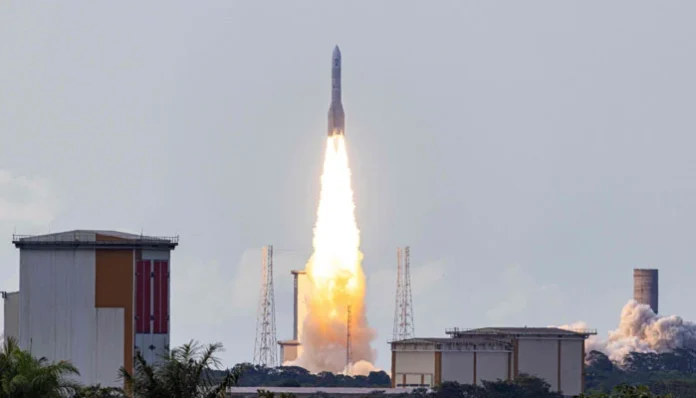Tuesday was the first successful launch of Europe’s Ariane 6, which experienced a data error just before departing Kourou, French Guiana at 4 p.m. local time.
The launch, which symbolizes the continent’s comeback to space research, was beset by the rocket’s inability to release its last set of payloads, according to Reuters.
Despite being non-commercial, the rocket’s deployment of three sets of microsatellites for research—observed by a Rafale fighter jet during its launch—led European space officials to proclaim the first journey a success.
The launch was originally scheduled to occur in 2020, but it was delayed for about four years due to political obstacles, delays, and financing disputes.
Europe’s Ariane 6 Blast s Off Into Space
“Europe is back in space,” declared Philippe Baptiste, the director of France’s CNES space agency, via video link to the European Space Agency’s (ESA) Paris headquarters, where staff members and legislators applauded the launch.
For the first time, the Vinci engine—which is meant to restart—was ignited in orbit, enabling Arianespace to launch payloads into different orbits.
But a smaller power unit failed to fire a third time, so the last set of payloads, two tiny capsules meant to test re-entry survival circumstances, were left locked on board.
“There was an oddity…”It is unlikely that we will complete this segment of the mission as planned,” stated Tina Buchner da Costa, an architect for the Ariane 6 launch system.
A system that is essential to the rocket’s capacity to place payloads in their appropriate orbit is the impacted auxiliary power unit.
Even though it happened so late in the mission, its failure is anticipated to prompt an engineering inquiry.
Nevertheless, according to ESA Director General Josef Aschbacher, the organization is on schedule to conduct a second flight by year’s end.
ArianeGroup, which is jointly owned by Airbus and Safran, created Ariane 6 at an estimated cost of 4 billion euros. The initial launch, which was supposed to happen in 2020, has kept getting pushed back.
Europe has been without a reliable way of launching satellites into orbit since the ESA retired its reliable Ariane 5 rocket over a year ago. Meanwhile, the conflict in Ukraine has severed Western connections to Russian Soyuz rockets, and Italy’s Vega C spacecraft is currently grounded.


